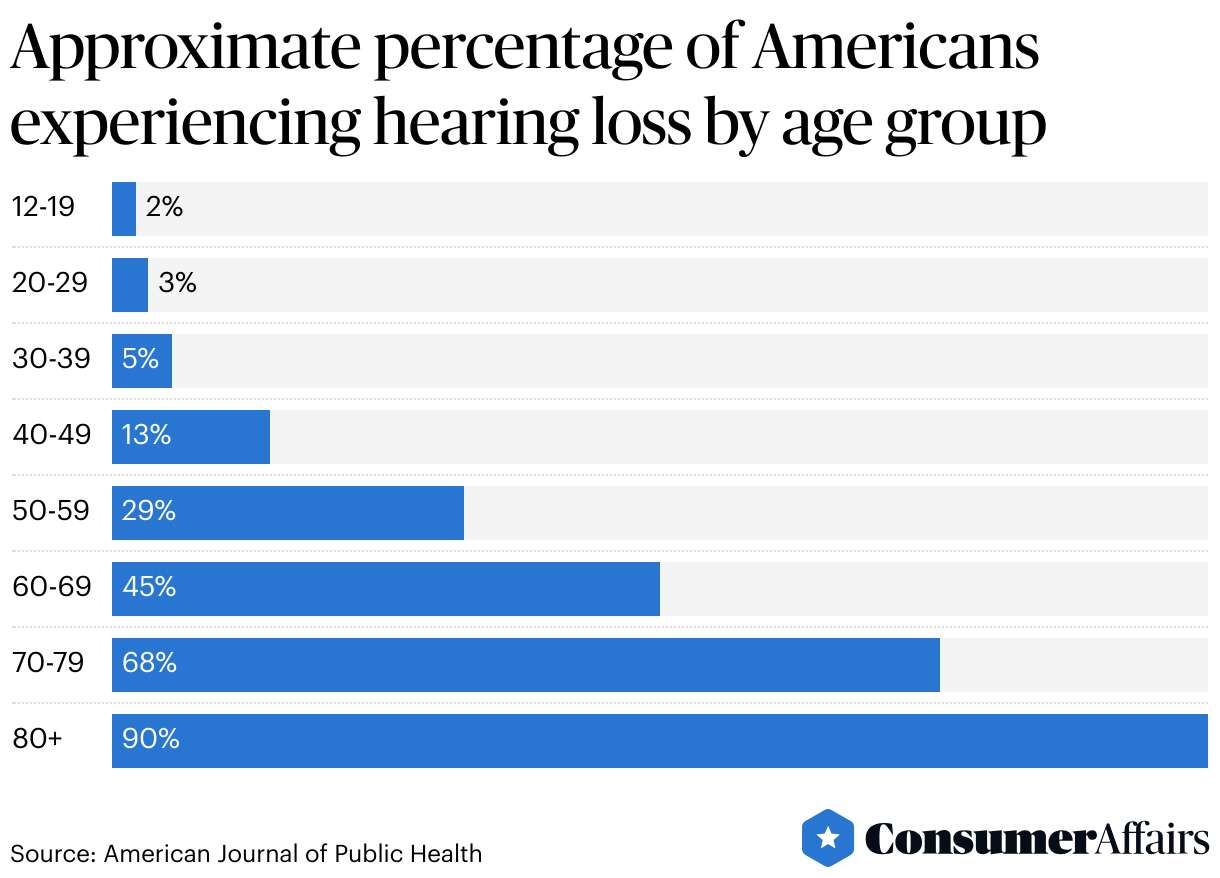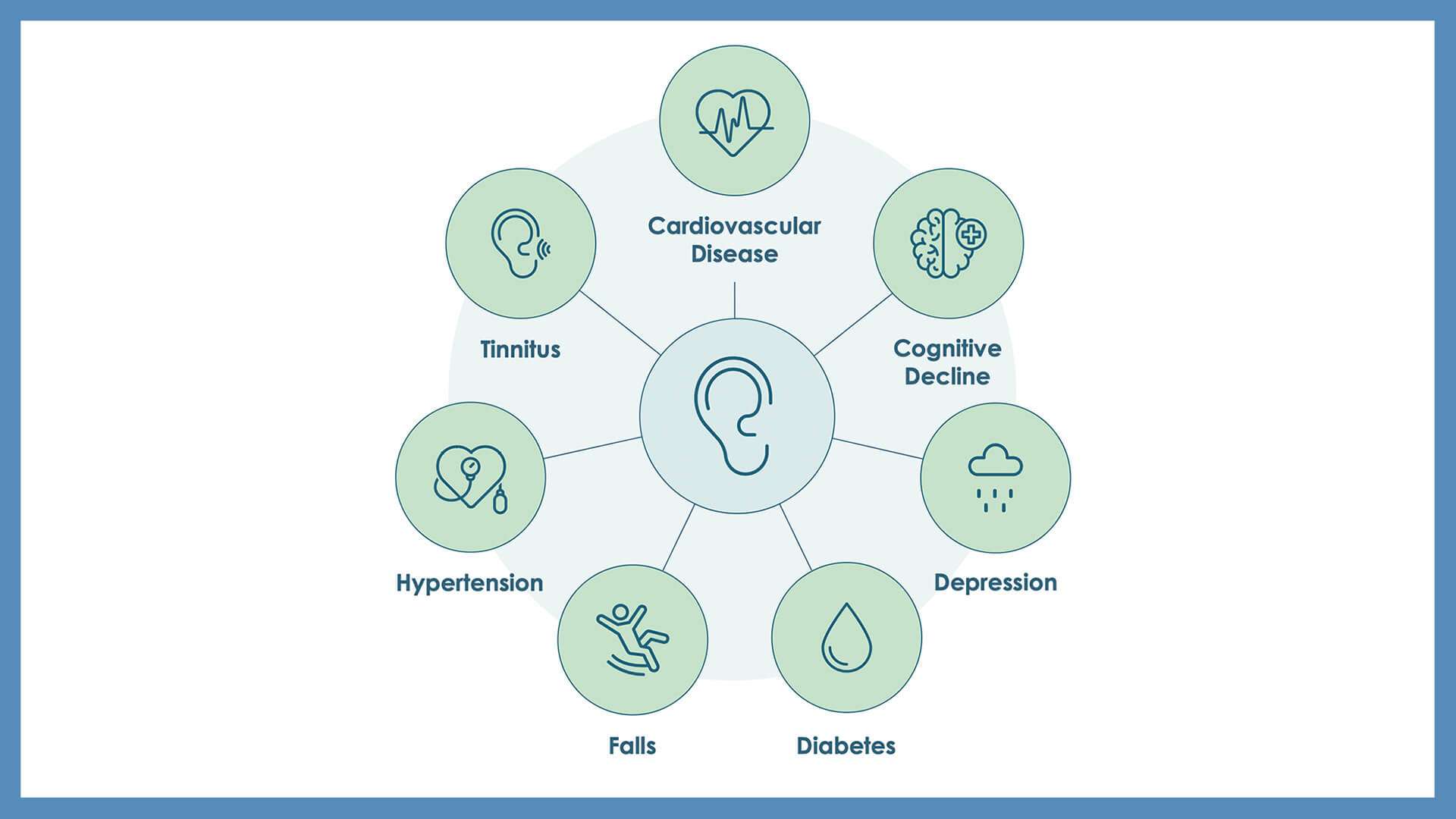Hearing loss is a common issue that affects millions of people around the world, particularly as they age. However, hearing loss is more than just a challenge of communication; it can significantly impact overall health, well-being, and even cognitive function. Numerous studies have shown a strong link between hearing loss and dementia, emphasizing the importance of early detection and intervention.
When Does Hearing Loss Begin?

Hearing loss often creeps up gradually, making it difficult for many individuals to recognize the changes until they become more pronounced. Approximately 37.5 million Americans experience hearing loss (National Institute on Deafness and Other Communication Disorders) and it tends to rise sharply with age.
- Age 40-49: Around 13% of adults in this age group experience some level of hearing loss.
- Age 50-59: The percentage increases to 29%.
- Age 60-69: Around 45% of people begin to experience noticeable hearing difficulties.
- Age 70-79: Hearing loss affects 68% of adults.
- Age 80+: Hearing loss jumps to 90% of adults in this group.
While some people begin to experience hearing loss in their 40s or 50s, it’s far more common to see significant hearing impairments later in life. By age 75, about one in two individuals will have some degree of hearing loss, and this age-related decline is known as presbycusis (Consumer Affairs).
The Link Between Hearing Loss and Dementia
Recent studies have highlighted an alarming connection between untreated hearing loss and cognitive decline, including dementia. One of the most well-known studies comes from Dr. Frank Lin at Johns Hopkins University, which found that mild hearing loss doubled the risk of dementia, moderate hearing loss tripled the risk, and severe hearing loss increased the risk by fivefold.
There are several theories as to why this connection exists:
- Cognitive Load: Hearing loss forces the brain to work harder to process sounds, potentially diverting resources away from other cognitive functions such as memory and thinking.
- Social Isolation: Hearing loss often leads to social withdrawal, as individuals may find it difficult or embarrassing to communicate with others. Loneliness and social isolation are well-known risk factors for cognitive decline and dementia.
- Brain Structure Changes: Studies have shown that untreated hearing loss can result in changes to the brain’s structure. Specifically, the areas of the brain responsible for sound processing may shrink, which can contribute to cognitive decline over time.
In a 2020 report from The Lancet Commission on Dementia Prevention, Intervention, and Care, hearing loss was listed as one of the top modifiable risk factors for dementia. It accounted for 8% of the risk for developing dementia, which is a larger percentage than diabetes or high blood pressure.
Other Comorbidities Linked to Hearing Loss

In addition to dementia, hearing loss is associated with several other health conditions. These comorbidities not only affect the individual’s hearing but can also contribute to their overall health decline. Some of the common comorbidities include:
Depression: People with untreated hearing loss are significantly more likely to suffer from depression. The inability to communicate effectively can lead to feelings of isolation, frustration, and sadness.
Cardiovascular Disease: Hearing loss has been linked to cardiovascular problems, such as high blood pressure and stroke. Poor blood circulation can affect the delicate structures in the ear, leading to hearing impairment.
Diabetes: Research shows that individuals with diabetes are twice as likely to have hearing loss compared to those without diabetes. The high blood sugar levels in diabetics can damage the small blood vessels and nerves in the inner ear, leading to hearing problems.
Falls: Hearing loss has also been linked to an increased risk of falls. A study conducted by Johns Hopkins Medicine found that individuals with mild hearing loss are nearly three times more likely to have a history of falling. The researchers suggest that the brain may struggle to maintain balance and spatial awareness when it’s working harder to process sound.
Cognitive Impairment: Even if not progressing to full dementia, hearing loss can lead to mild cognitive impairment (MCI). MCI is often a precursor to dementia, and individuals with untreated hearing loss are more likely to develop this condition.
The Impact of Hearing Aids on Cognitive Health

The good news is that early intervention can help mitigate the risks associated with hearing loss. Studies suggest that hearing aids reduced the risk of dementia by almost 50% and improved cognitive function in older adults (Johns Hopkins).
It’s important to note, however, that while hearing aids can improve communication and quality of life, they cannot reverse cognitive damage that has already occurred. This underscores the importance of getting regular hearing check-ups and addressing hearing loss early before it leads to more serious issues.
Schedule a Hearing Test

Hearing loss is not just an inconvenience or a natural part of aging—it’s a serious health issue that can have profound effects on cognitive function and overall well-being. The link between hearing loss and dementia is well-established, but the good news is that early intervention, especially with the use of hearing aids, can help reduce the risk.
If you or a loved one is experiencing hearing difficulties, it’s important to schedule a hearing test with BergerHenry ENT hearing specialists as soon as possible. Addressing hearing loss early can help prevent cognitive decline and maintain a higher quality of life.

